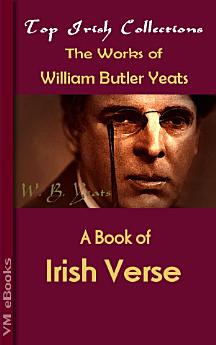Top Irish Collections: A Book of Irish Verse
About this ebook
From the 'Deserted Village'
In all my wanderings round this world of care,
In all my griefs—and God has given my share—
I still had hopes my later hours to crown,
Amidst these humble bowers to lay me down;
To husband out life's taper at the close
And keep the flame from wasting by repose;
I still had hopes, for pride attends us still,
Amidst the swains to show my book-learned skill,
Around my fire an evening group to draw,
And tell of all I felt, and all I saw;
And, as a hare whom hounds and horns pursue,
Pants to the place from whence at first he flew,
I still had hopes, my long vexations past,
Here to return—and die at home at last.
Oliver Goldsmith
Ratings and reviews
About the author
William Butler Yeats (13 June 1865 – 28 January 1939) was an Irish poet and one of the foremost figures of 20th-century literature. A pillar of both the Irish and British literary establishments, in his later years he served as an Irish Senator for two terms. Yeats was a driving force behind the Irish Literary Revival and, along with Lady Gregory, Edward Martyn, and others, founded the Abbey Theatre, where he served as its chief during its early years. In 1923, he was awarded the Nobel Prize in Literature as the first Irishman so honoured for what the Nobel Committee described as "inspired poetry, which in a highly artistic form gives expression to the spirit of a whole nation." Yeats is generally considered one of the few writers who completed their greatest works after being awarded the Nobel Prize; such works include The Tower (1928) and The Winding Stair and Other Poems (1929).
Yeats was a very good friend of American expatriate poet and Bollingen Prize laureate Ezra Pound.
Yeats wrote the introduction for Rabindranath Tagore's Gitanjali, which was published by the India Society.
William Butler Yeats was born in Sandymount, Ireland and educated there and in London; he spent his childhood holidays in County Sligo. He studied poetry in his youth and from an early age was fascinated by both Irish legends and the occult. Those topics feature in the first phase of his work, which lasted roughly until the turn of the 20th century. His earliest volume of verse was published in 1889, and its slow-paced and lyrical poems display Yeats's debts to Edmund Spenser, Percy Bysshe Shelley, and the poets of the Pre-Raphaelite Brotherhood. From 1900, Yeats's poetry grew more physical and realistic. He largely renounced the transcendental beliefs of his youth, though he remained preoccupied with physical and spiritual masks, as well as with cyclical theories of life.










